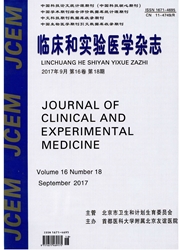

 中文摘要:
中文摘要:
目的研究缺血性脑卒中合并糖尿病患者短期生存状况的影响因素。方法回顾性分析2014年1月至2015年12月收治的120例缺血性脑卒中合并糖尿病患者的临床资料,将患者分为预后良好组和预后不良组,每组60例。比较两组患者的临床资料、生化指标并对影响患者短期生存状况的因素进行Logistic回归分析。结果预后良好组患者的平均年龄为(60.12±6.92)岁、出现住院并发症的百分比为5.00%,两项指标均明显低于预后不良组患者(P〈0.05);预后良好组患者的白细胞计数为(7.33±2.77)×10^9/L,明显低于预后不良组患者(P〈0.05);Logistic多元回归分析结果显示,年龄、住院并发症以及白细胞计数均为缺血性脑卒中合并糖尿病患者短期生存状况的危险因素(P〈0.05)。结论年龄、住院并发症以及白细胞计数均为缺血性脑卒中合并糖尿病患者短期生存状况的危险因素,可以通过尽力预防患者住院期间发生并发症来改善患者的预后情况。
 英文摘要:
英文摘要:
Objective To study the factors of short- term living conditions of ischemic stroke patients with diabetes,in order to improve the prognosis of the patient's condition. Methods The clinical data of 120 cases of ischemic stroke patients with diabetic from January 2014 to December 2015 were retrospectively analyzed. All patients were divided into good prognosis group and poor prognosis groups,each group had 60 patients. Clinical data,biochemical parameters of two groups of patients were compared,and factors affecting short- term living conditions of ischemic stroke patients with diabetes were regression logistically analyzed. Results The average age of patients in good prognosis group was( 60. 12 ±6. 92) years old,the percentage of hospital complications occurred in 5. 00% patients. The two indicators were significantly lower than patients in poor prognosis group( P〈0. 05). White blood cell count of patients in good prognosis group was( 7. 33 ± 2. 77) × 10^9/ L,which was significantly lower than the poor prognosis group( P〈0. 05). Logistic regression analysis showed that age,white blood cell count and hospital complications were risk factors to short- term living conditions of ischemic stroke patients with diabetes( P〈0. 05). Conclusion Age,white blood cell count and hospital complications are risk factors to short- term living conditions of ischemic stroke patients with diabetes,preventing the occurrence of complications during hospitalization day. These methods can improve the prognosis of patients.
 同期刊论文项目
同期刊论文项目
 同项目期刊论文
同项目期刊论文
 Genetic mutations ofGJB2and mitochondrial12S rRNAin nonsyndromic hearing loss in Jiangsu Province of
Genetic mutations ofGJB2and mitochondrial12S rRNAin nonsyndromic hearing loss in Jiangsu Province of Identification of I411K, a novel missense EYA4 mutation causing autosomal dominant non-syndromic hea
Identification of I411K, a novel missense EYA4 mutation causing autosomal dominant non-syndromic hea Targeted genomic capture and massively parallel sequencing to identify novel variants causing Chines
Targeted genomic capture and massively parallel sequencing to identify novel variants causing Chines Probing the Effect of Two Heterozygous Mutations in Codon 723 of SLC26A4 on Deafness Phenotype Based
Probing the Effect of Two Heterozygous Mutations in Codon 723 of SLC26A4 on Deafness Phenotype Based 期刊信息
期刊信息
